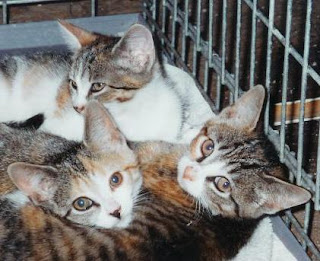According to the 2010 GFK Roper AP-Petside.com Poll over half of the pets in American homes were not purchased from a pet store, shelter or breeder – but were obtained “elsewhere”. Although they don’t delineate what “elsewhere” means, it’s pretty safe to assume that at least with cats, they were found outdoors or given to the caregiver by a friend, relative or neighbor who found the cat outdoors or had a cat with kittens. Many shelters and rescues deplore this type of adoption openly through media campaigns – press releases, t-shirts and bumper stickers – advocating for rescue adoptions only. “Free Kitten Signs” are the bane of the animal welfare movement.
Yet are “free” kittens any less loved in their adopted homes than “purchased” kittens or cats? Does putting a price tag on a pet – purchased from a pet store, rescue or shelter – guarantee they get a good home?
The February issue of Cornell’s veterinary newsletter Cat Watch reported on a study published in the Journal of Applied Animal Welfare Science (October 2009). It compared 173 cat adoptions. 95 participants received their cats for free while the other 78 paid $75 for their cats. Their attachment to their cats was compared and no significant differences were found. They concluded that if shelters adopted out adult cats for free it would speed up adoptions significantly (making more cages available for new admissions) and would result in a dramatic reduction in shelter euthanasia.
If you have any doubt that a free cat would be any less loved than a purchased cat – from a shelter, rescue or pet store – just ask yourself a simple question. “If you got your cat for free – and the odds are you actually did – would you love him or her any less than if you had paid money for her?” Of course you wouldn’t.
The practice of shelters charging for pets is more one of economics than anything else. Shelters need to offset their costs or they can’t exist. In a perfect world, the offset would come from community contributions and not be tied to services. Their clients – the cats and dogs in their care – are better served without having a price tag around their necks. (Due diligence comes from adoption interviews and checking references.) If shelters asked for voluntary donations instead of charging mandatory fees they may be pleasantly surprised at the results. It’s illegal to pay for human babies – and one day we’ll view companion pets this way too.
In the meantime, if we really want to see those “free kittens” ads and signs go away, we would provide community-wide accessible and free spay/neuter. Once we get pet cats routinely fixed there won’t be many mama cats out there to challenge the system.


No comments:
Post a Comment